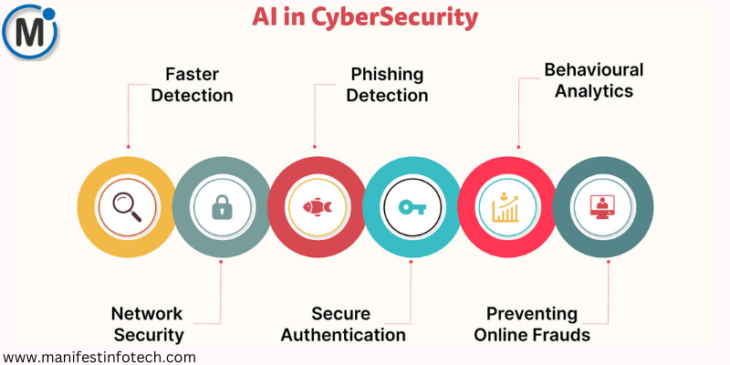
In today’s digital world, cybersecurity threats are evolving rapidly, making it increasingly challenging for organizations to protect sensitive data. Artificial Intelligence (AI) has emerged as a powerful tool in combating cyber threats by enhancing security measures and enabling proactive threat detection. AI-driven cybersecurity solutions provide real-time monitoring, predictive analytics, and automated responses, significantly improving digital security.
AI in Cyber Threat Detection
Traditional cybersecurity methods rely on predefined signatures and rule-based systems, which are often insufficient against sophisticated cyberattacks. AI, with its machine learning (ML) capabilities, can analyze vast amounts of data to identify patterns and detect anomalies that could indicate potential threats. This proactive approach allows organizations to respond to cyber threats before they cause significant damage.
Automated Threat Response
AI-powered systems can automatically respond to threats, minimizing the time required to mitigate cyber risks. Automated threat response mechanisms can isolate compromised devices, block malicious traffic, and patch vulnerabilities without human intervention. This reduces the workload on security teams and ensures faster incident resolution.
Behavioral Analysis for Anomaly Detection
AI can continuously monitor user behavior and network activities to detect deviations from normal patterns. If an AI system identifies unusual access attempts or data transfers, it can trigger alerts and initiate security protocols. This is particularly useful in identifying insider threats and advanced persistent threats (APTs) that traditional security measures might overlook.
AI in Phishing and Fraud Prevention
Cybercriminals often use phishing attacks to steal sensitive information. AI-driven security systems can analyze emails, URLs, and user behavior to detect phishing attempts in real-time. By leveraging Natural Language Processing (NLP) and deep learning, AI can identify fraudulent activities and block malicious content before it reaches the end user.
Enhancing Endpoint Security
AI-driven endpoint protection solutions safeguard devices such as computers, mobile phones, and IoT devices from malware and ransomware attacks. These solutions use AI to detect and neutralize threats before they compromise system integrity, ensuring comprehensive security across multiple endpoints.
Challenges and Ethical Considerations
While AI enhances cybersecurity, it also presents challenges such as false positives, adversarial attacks, and ethical concerns regarding data privacy. Cybercriminals are also leveraging AI to develop more sophisticated attacks, making it essential for cybersecurity experts to stay ahead in the AI-driven security race.
Conclusion
AI plays a crucial role in strengthening cybersecurity by enabling intelligent threat detection, automated responses, and proactive risk management. As cyber threats continue to evolve, integrating AI into cybersecurity frameworks will be essential for organizations to stay secure in the digital landscape. By leveraging AI effectively, businesses can protect their data, maintain compliance, and enhance overall cybersecurity resilience.
If you are looking for any services related to Website Development, App Development, Digital Marketing and SEO, just email us at nchouksey@manifestinfotech.com or Skype id: live:76bad32bff24d30d
𝐅𝐨𝐥𝐥𝐨𝐰 𝐔𝐬:
𝐋𝐢𝐧𝐤𝐞𝐝𝐢𝐧: linkedin.com/company/manifestinfotech
𝐅𝐚𝐜𝐞𝐛𝐨𝐨𝐤: facebook.com/manifestinfotech/
𝐈𝐧𝐬𝐭𝐚𝐠𝐫𝐚𝐦: instagram.com/manifestinfotech/
𝐓𝐰𝐢𝐭𝐭𝐞𝐫: twitter.com/Manifest_info
#DataPrivacy #CyberSecurity #Compliance #PrivacyRegulations #AIinCybersecurity #MachineLearning #ThreatDetection #DataProtection